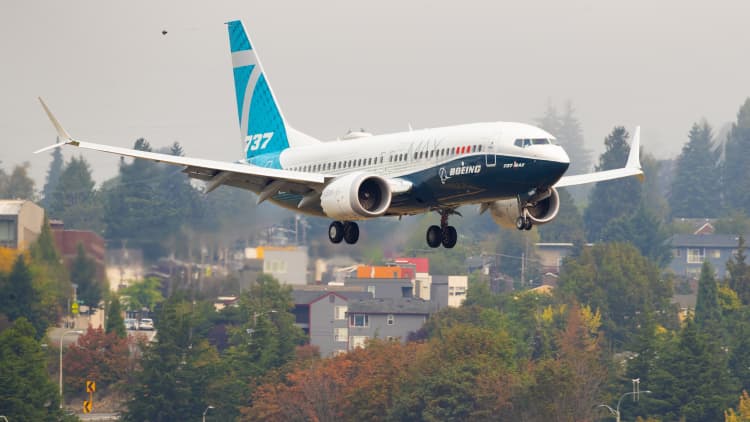
Boeing posted a record annual loss of nearly $12 billion, taking a $6.5 billion charge in the fourth quarter on its newest airplane which it now doesn't expect to debut until 2023, more than two years behind schedule.
The company's problems stemming from two deadly 737 Max crashes have snowballed in the coronavirus pandemic. A plunge in travel demand has roiled airlines' finances and devastated sales, including of its newest jet, the 777X. Those weaker appetites and additional scrutiny of new aircraft following the 737 Max crisis will delay deliveries of the 777X plane. That wide-body jetliner is used for international routes, which are suffering the most in the pandemic.
Boeing's shares tumbled nearly 4% on Wednesday to $194.03.
"I'm sure glad 2020 is in the rearview mirror," CEO Dave Calhoun said in an interview with CNBC's "Squawk on the Street."
Its 777X program had already been beset by engineering delays. Boeing now says it expects to deliver the first one at the end of 2023, more than two years later than its forecast last April, because of weaker demand and increased certification requirements in the wake of the 737 Max crisis.
"We are determined to meet every compliance requirement from every regulator in the world on day one, which meant that we had to incorporate a few design changes," Calhoun said of the 777X. "So it is going to be a little more costly, it is going to take a little longer ultimately to certify."
The company lost a whopping $15.25 a share in the fourth quarter on an adjusted basis that took Wall Street by surprise; analysts had forecast a loss of $1.80 share. The company also booked a $468 million write-down against "abnormal production costs" on the 737 Max program.
Boeing's fourth-quarter revenue dropped 15% from a year earlier to $15.3 billion, better than analysts' forecasts for $15.07 billion in sales. The company's net loss for the three months widened to $8.4 billion from $1.01 billion in the fourth quarter of 2019. It doesn't expect to return to cash flow positive until 2022.
Boeing ceded more ground to rival Airbus as the U.S. manufacturer's aircraft deliveries plunged to the lowest in decades, and cancellations hit records last year. 2021 is shaping up to be another challenging year for the aviation industry as new travel restrictions and coronavirus infections curb already depressed demand for flights.
The pandemic's impact on longer, international flights is compounding problems for Boeing's 787 Dreamliners. The company had previously cut output of those jets and additional scrutiny following production issues has hampered deliveries, which are key to Boeing because it's when customers pay the bulk of the plane's price. It said it doesn't expect to deliver any Dreamliners this month and very few "if any" in February.
The Chicago-based aircraft manufacturer is also trying to turn the page from two crashes of its 737 Max that killed all 346 on board.
European regulators on Wednesday lifted their safety ban on the planes. U.S. aviation regulators had done so in November, allowing Boeing to start delivering roughly 400 new jets it had in storage at its Seattle-area facility. American Airlines, United Airlines, Alaska Airlines, Aeromexico and Brazil's Gol are among the carriers that have received Max planes so far.


